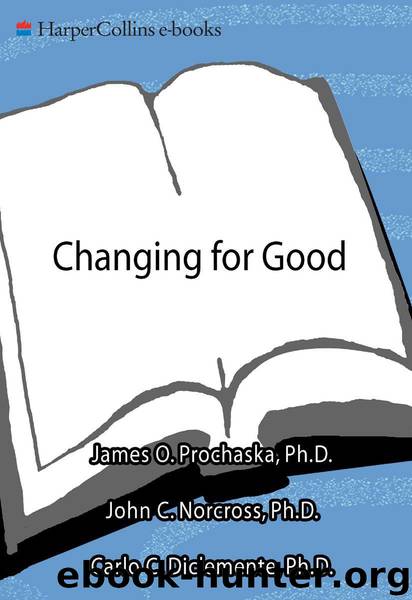Changing for Good by Norcross John C.;Prochaska James O.;Diclemente Carlo C

Author:Norcross, John C.;Prochaska, James O.;Diclemente, Carlo C. [Norcross, John C.;Prochaska, James O.;Diclemente, Carlo C.]
Language: eng
Format: mobi
Publisher: Harper Collins, Inc.
Published: 2010-08-08T20:00:00+00:00
PC → A = 1 S.D. ↑ PROS
The Weak Principle of Progress states that progression from precontemplation to action involves approximately a .5 S.D. decrease in the cons of making a healthy behavior change.
PC → A = .5 S.D. ↓ CONS
What are some of the implications of these principles? First, if you are in the precontemplation stage with a particular problem, you are going to have to increase your perception of the pros by 1 S.D. in order to be adequately prepared to take effective action. This is like raising your behavior change IQ by 15 points. Fortunately, we are confident that by reading this book, the average person can raise his or her behavior-change IQ by at least 15 points. You may not be gifted when you’re finished, but you may become a much brighter self-changer!
Second, you’ve always known that you have to be highly motivated if you’re going to change a chronic problem behavior. But you’ve never known how high your motivation should be. The principles of progress will help you to assess your level of motivation, though we prefer the term “preparation.” It’s hard to imagine consciously and willfully increasing your motivation. It’s much easier to imagine consciously and willfully improving your preparation. The assessments in this book are designed to give you feedback about your efforts at preparing for change.
Preparation lies in the balance between your perception of the pros and cons of changing. If you are currently in the precontemplation stage, you are likely to perceive the cons of changing as outweighing the pros. You will need to increase your pros of changing twice as much as you will need to decrease the cons. Furthermore, the processes of change applied in the early stages have the greatest impact on the pros. The processes you apply in the preparation and action stages have the greatest impact on the cons.
We have placed this section on the principles of progress here, immediately before the chapter on action, as a kind of Do Not Pass Go warning. By all means, read the book once through, to give yourself an overview of the stages. But once you’re ready to embark on the journey of change, be sure to work methodically through the stages. Many people will be tempted to head straight for the action techniques before they are fully convinced of the pros and cons of changing. According to our model, if you bypass the contemplation and preparation stages, your change efforts are highly likely to fail. The preceding section gives you an example of the strong mathematical evidence that lies behind our model.
We use the metaphor of people who would like to run the Boston Marathon. Those who aren’t prepared at all are probably in the precontemplation stage and don’t intend to enter this year’s race. Those who are more prepared and are in the contemplation stage may intend to enter this year’s race, but because of ambivalence about the pros and cons of running, they sign up for the race but do not show up.
Download
This site does not store any files on its server. We only index and link to content provided by other sites. Please contact the content providers to delete copyright contents if any and email us, we'll remove relevant links or contents immediately.
Goodbye, Things by Fumio Sasaki(8575)
The Road Less Traveled by M. Scott Peck(7592)
Daring Greatly by Brene Brown(6501)
Big Magic: Creative Living Beyond Fear by Elizabeth Gilbert(5753)
Grit by Angela Duckworth(5601)
Ego Is the Enemy by Ryan Holiday(5412)
Discipline Equals Freedom by Jocko Willink(5378)
The Laws of Human Nature by Robert Greene(5170)
The Wisdom of Sundays by Oprah Winfrey(5153)
You Are a Badass at Making Money by Jen Sincero(4920)
Influence: The Psychology of Persuasion by Robert B. Cialdini(4772)
The Miracle Morning by Hal Elrod(4711)
Rising Strong by Brene Brown(4448)
Reflections Of A Man by Mr. Amari Soul(4287)
A Simplified Life by Emily Ley(4156)
The Power of Positive Thinking by Norman Vincent Peale(4056)
Seriously... I'm Kidding by Ellen DeGeneres(3627)
How to Win Friends and Influence People in the Digital Age by Dale Carnegie & Associates(3544)
The Courage to Be Disliked by Ichiro Kishimi & Fumitake Koga(3485)
